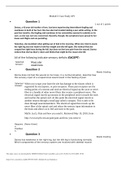Summary Responsible Data Science
(INFOB3RDS) Lecture 1-6 Endterm
Glossary
Act utilitarianism: choose action that maximizes utility
Algorithmic bias: bias due to wrong algorithm, does not work well with your data.
Ambiguity effect (cognitive bias): always prefer known risks over unknown risks
Analytical bias (data bias): results from how results are evaluated
Anchoring effect (cognitive bias): people rely too much on first piece of information (which
can be irrelevant)
Appropriate details (XAI property): (the amount of) details in explanation should be relevant
Association bias: data reinforces cultural bias, (mostly ‘gender bias’), result of training data.
Attraction effect (decoy effect): chooser tends to choose items that have more (slightly
worse) competitors, instead of just considering logical alternatives (choice is influenced)
Automation bias (human bias: blindly trusting technology. Very psychological.
Backward chaining: explain results, get facts from results
Bandwagon effect (cognitive bias): basing your decision on what the crowd does
Base rate fallacy (cognitive bias): people ignore statistical base rates of incidents
Black-box algorithm: model representation shaped by algorithm, not understandable to
humans.
Categorical imperatives: things you should follow regardless your desires
Clarity (XAI property): explanations should be clearly understandable
Cognitive bias: tricks our thinking instead of vision.
Completeness (XAI property): explanations should explain everything you need to know
Confirmation bias (cognitive bias): we tend to seek information confirming our beliefs
Confirmation bias (human bias): “see what you want to see”, results of interpretations
Contractarianism: we make up morality with an agreed-upon contract, by cooperation.
Decoy effect: (compare to attraction effect): 3rd (inferior alternative) changes preference
Demographic parity (algorithmic fairness measure): low difference between proportion of
privileged subjects in both groups.
Dimensions of variation (XAI property): explanation should reveal where boundaries are
(what is needed to change outcome)
Disparate impact (algorithmic fairness measure): ratio of certain group in privileged &
unprivileged groups should be equal
Dunning-kruger effect (cognitive bias): low-ability people overestimate themselves, while
high-ability people underestimate themselves
Equalized odds (algorithmic fairness measure): low difference between TPR & FPR of both
groups
Equal opportunity (algorithmic fairness measure): TPR (almost) equal groups are treated
similarly.
Exclusion bias (human bias): systematically excluding certain data
Feature relevance: measure relevance of each feature. Loal: feature contributions for
specific prediction; Global: take all predictions into account (explain entire model overall)
Formula of humanity: humans are the end, not the means.
Forward chaining: derive results from facts
, Framing effect (cognitive bias): caused by perspective
Fundamental attribution error (cognitive bias): credit success to yourself but failure to others
Funding bias (human bias): favor interest group / sponsors in study
General (“strong”) AI: AI that can learn and use intelligence autonomously.
Hasty generalization (cognitive bias): generalize too fast, while your experiences are limited
Hindsight bias (cognitive bias): saying “i knew it all along” afterwards
Human bias: human psychological disposition to oversee things.
Hypothetical imperatives: if you desire X, you should do Y
Identifiable victim effect (cognitive bias): people ignore impersonal representations of e.g.
poverty, but will help a specific person
Inertia (status quo bias) (cognitive bias): stick to current situation, fearing change
Jens Gulden: main lecturer of RDS.
Kantianism: morality is constant. morality depends on intentions, not on outcome.
Layer-wise Relevance Propagation (LRP): understand ANN in the background, by
propagating the prediction backwards. Understand which parameters have highest influence.
Local explanations: model agnostic explanation: does not care about internal model, but only
about a specific input instance (local)
Measurement bias (data bias): data inaccurately reflects population, badly recorded.
Metaethics: foundation / origins of ethical principles. Grounding problem: looking for clear
unmoving moral belief.
Model simplification (XAI): simplifying a model, e.g. constructing a DT from ANN.
Moral absolutism (in moral realism: most extreme version of moral realism, moral facts are
unchangeable and universal.
Moral anti-realism (metaethical belief): there are no objective moral facts, they are
expressions of our emotional attitude rather than of the state of the world.
Moral realism (metaethical belief): objective morals exist, independent of human beliefs.
Moral relativism (in moral realism): moral facts are true / false only relative to specific
contexts
Moral subjectivism (in moral anti-realism): morals can be true or false, it is a matter of
preference
Narrow (“weak”) AI: statistically trained AI, works for predefined problems
Observability (XAI property): explanation should explain internal mechanism
Observer bias (human bias): researcher projects his expectations in the research (in
decisions)
Omitted variable bias (data bias): data lacks relevant features
Outgroup homogeneity bias (cognitive bias): people out of your own group seem more alike
Overgeneralization (human bias): generalize too quickly (I have seen 10 swans and they
were all white, therefore black swans do not exist)
Perceptual bias: distorts our perceptions / sensory experience.
Pseudonymization by encryption: pseudonymize data by encrypting sensitive data.
Pseudonymization by tokenization: pseudonymize data by giving each entry an anonymous
ID (token) based on name
Racial / gender bias: resulting from selection bias of training data.
Recall bias: Similar types are labeled consistently, due to human interpretation differences
Rule utilitarianism: maximize utility in the long run
Selection bias (data bias): some data points have more chance to be included, no proper
randomization is used
Soundness (XAI property): explanations should be consistent, reasonable, plausible
(INFOB3RDS) Lecture 1-6 Endterm
Glossary
Act utilitarianism: choose action that maximizes utility
Algorithmic bias: bias due to wrong algorithm, does not work well with your data.
Ambiguity effect (cognitive bias): always prefer known risks over unknown risks
Analytical bias (data bias): results from how results are evaluated
Anchoring effect (cognitive bias): people rely too much on first piece of information (which
can be irrelevant)
Appropriate details (XAI property): (the amount of) details in explanation should be relevant
Association bias: data reinforces cultural bias, (mostly ‘gender bias’), result of training data.
Attraction effect (decoy effect): chooser tends to choose items that have more (slightly
worse) competitors, instead of just considering logical alternatives (choice is influenced)
Automation bias (human bias: blindly trusting technology. Very psychological.
Backward chaining: explain results, get facts from results
Bandwagon effect (cognitive bias): basing your decision on what the crowd does
Base rate fallacy (cognitive bias): people ignore statistical base rates of incidents
Black-box algorithm: model representation shaped by algorithm, not understandable to
humans.
Categorical imperatives: things you should follow regardless your desires
Clarity (XAI property): explanations should be clearly understandable
Cognitive bias: tricks our thinking instead of vision.
Completeness (XAI property): explanations should explain everything you need to know
Confirmation bias (cognitive bias): we tend to seek information confirming our beliefs
Confirmation bias (human bias): “see what you want to see”, results of interpretations
Contractarianism: we make up morality with an agreed-upon contract, by cooperation.
Decoy effect: (compare to attraction effect): 3rd (inferior alternative) changes preference
Demographic parity (algorithmic fairness measure): low difference between proportion of
privileged subjects in both groups.
Dimensions of variation (XAI property): explanation should reveal where boundaries are
(what is needed to change outcome)
Disparate impact (algorithmic fairness measure): ratio of certain group in privileged &
unprivileged groups should be equal
Dunning-kruger effect (cognitive bias): low-ability people overestimate themselves, while
high-ability people underestimate themselves
Equalized odds (algorithmic fairness measure): low difference between TPR & FPR of both
groups
Equal opportunity (algorithmic fairness measure): TPR (almost) equal groups are treated
similarly.
Exclusion bias (human bias): systematically excluding certain data
Feature relevance: measure relevance of each feature. Loal: feature contributions for
specific prediction; Global: take all predictions into account (explain entire model overall)
Formula of humanity: humans are the end, not the means.
Forward chaining: derive results from facts
, Framing effect (cognitive bias): caused by perspective
Fundamental attribution error (cognitive bias): credit success to yourself but failure to others
Funding bias (human bias): favor interest group / sponsors in study
General (“strong”) AI: AI that can learn and use intelligence autonomously.
Hasty generalization (cognitive bias): generalize too fast, while your experiences are limited
Hindsight bias (cognitive bias): saying “i knew it all along” afterwards
Human bias: human psychological disposition to oversee things.
Hypothetical imperatives: if you desire X, you should do Y
Identifiable victim effect (cognitive bias): people ignore impersonal representations of e.g.
poverty, but will help a specific person
Inertia (status quo bias) (cognitive bias): stick to current situation, fearing change
Jens Gulden: main lecturer of RDS.
Kantianism: morality is constant. morality depends on intentions, not on outcome.
Layer-wise Relevance Propagation (LRP): understand ANN in the background, by
propagating the prediction backwards. Understand which parameters have highest influence.
Local explanations: model agnostic explanation: does not care about internal model, but only
about a specific input instance (local)
Measurement bias (data bias): data inaccurately reflects population, badly recorded.
Metaethics: foundation / origins of ethical principles. Grounding problem: looking for clear
unmoving moral belief.
Model simplification (XAI): simplifying a model, e.g. constructing a DT from ANN.
Moral absolutism (in moral realism: most extreme version of moral realism, moral facts are
unchangeable and universal.
Moral anti-realism (metaethical belief): there are no objective moral facts, they are
expressions of our emotional attitude rather than of the state of the world.
Moral realism (metaethical belief): objective morals exist, independent of human beliefs.
Moral relativism (in moral realism): moral facts are true / false only relative to specific
contexts
Moral subjectivism (in moral anti-realism): morals can be true or false, it is a matter of
preference
Narrow (“weak”) AI: statistically trained AI, works for predefined problems
Observability (XAI property): explanation should explain internal mechanism
Observer bias (human bias): researcher projects his expectations in the research (in
decisions)
Omitted variable bias (data bias): data lacks relevant features
Outgroup homogeneity bias (cognitive bias): people out of your own group seem more alike
Overgeneralization (human bias): generalize too quickly (I have seen 10 swans and they
were all white, therefore black swans do not exist)
Perceptual bias: distorts our perceptions / sensory experience.
Pseudonymization by encryption: pseudonymize data by encrypting sensitive data.
Pseudonymization by tokenization: pseudonymize data by giving each entry an anonymous
ID (token) based on name
Racial / gender bias: resulting from selection bias of training data.
Recall bias: Similar types are labeled consistently, due to human interpretation differences
Rule utilitarianism: maximize utility in the long run
Selection bias (data bias): some data points have more chance to be included, no proper
randomization is used
Soundness (XAI property): explanations should be consistent, reasonable, plausible










